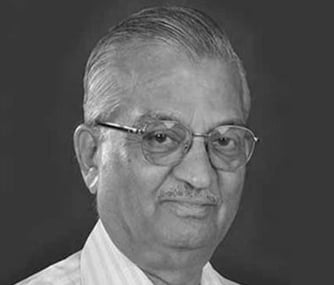




Anil Kakodkar
Dr Anil Kakodkar joined the Bhabha Atomic Research Centre (BARC) in 1964, following the one year post graduate training with top rank in Nuclear Science and Technology in the then Atomic Energy Establishment. He became the Director of BARC in the year 1996 and was the Chairman, Atomic Energy Commission and Secretary to the Government of India, Department of Atomic Energy, during the years 2000 -2009. Currently he is DAE Homi Bhabha Chair Professor at BARC.
Kakodkar has worked for the development of the atomic energy programme in India throughout his professional life. Undeterred by the restrictions imposed by the international community, he succeeded in developing various systems for the pressurized heavy water reactor, in building the Dhruva reactor starting from the conceptual stage, in rehabilitation of Madras Atomic Power Station Units 1&2 both of which at one stage appeared to be on the verge of being written off following failure of the moderator inlet manifolds, in conceptualization and development of Advanced Heavy Water Reactor that realizes the next generation objectives through innovative configuration of present day technologies besides use of thorium.
Kakodkar has been a key contributor to India’s strategic programme. He was among the chosen few involved in the first successful Peaceful Nuclear Explosion Experiment that India conducted on May 18, 1974 at Pokhran. And later, he played a key role in the series of successful Nuclear Tests conducted during May 1998, again at Pokhran. India also demonstrated nuclear submarine powerpack technology under Kakodkar’s leadership.
Kakodkar’s sterling leadership led to a significant boost to India’s nuclear power programme notwithstanding the uranium supply constraints. As a result and with the completion of projects already underway, India’s nuclear generation capacity is set to reach 10,000 MWe as well as poised for a rapid scale up thereafter. The comprehensive and robust programme under Kakodkar’s leadership has earned India a distinctive status as a country with advanced nuclear technology.
Notable also are his innovative contributions to human resource development activities. Establishment of NISER (National Institute of Science Education and Research), DAE-Mumbai University CBS (Centre for Basic Sciences) and HBNI (Homi Bhabha National Institute) are expected to result in a fresh wave of human resource development, generating greater experimental capabilities and bringing in linkage between basic research and technology development for the acceleration of India’s multifaceted atomic energy programme.
A committee under his Chairmanship has worked out a detailed report for greater autonomy of IITs and taking them to world class level. He also chairs an empowered committee to take the process forward. He also led a committee set up by Government of Maharashtra to look at higher education in the State. The committee has made important recommendations that could lead to a paradigm change for improvement of higher education in the State. Another high-level committee under his Chairmanship has made comprehensive recommendations for improvement of safety on Indian Railway.
Notable also are his innovative contributions to human resource development activities. Establishment of NISER (National Institute of Science Education and Research), DAE-Mumbai University CBS (Centre for Basic Sciences) and HBNI (Homi Bhabha National Institute) are expected to result in a fresh wave of human resource development, generating greater experimental capabilities and bringing in linkage between basic research and technology development for the acceleration of India’s multifaceted atomic energy programme.